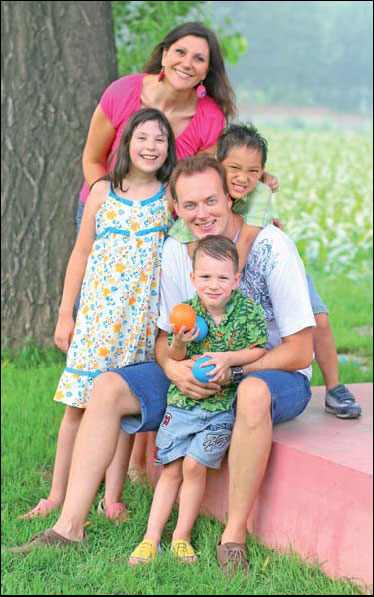Grassroots love
Updated: 2011-12-02 11:49
By Mike Peters (China Daily European Weekly)
|
|||||||||
 |
|
Guillaume with wife Delphine and children Emilie (left), David (right), and Benjamin. |
"We always had a dream to have a facility that was ecologically based," he says, waving at the two main fields of a farm that now supplies the kitchen pantry and provides income through produce sales.
There are about 200 chickens ("we're selling eggs"), goats ("they're pretty useless we haven't developed the facilities you need to make cheese properly") and a series of garden-therapy plots ("we do the square-foot gardening to give kids that hands-on experience").
Making life real for the kids is always Job One.
"Blind kids who are mentally normal can become abnormal, even autistic, because they are shunned or treated as mentally deficient," says Guillaume.
Avoiding that tragedy is top priority at Bethel, but the mission for those blind youngsters is life-long.
State-run orphanages are more proactive today about helping people with disabilities, he says, but the infrastructure isn't there and the needs are great.
The Gauvains see the Bethel facility, where nearly 100 staff members include primary care-givers, as a first step.
An outreach program would have "mini-Bethels" inside one State orphanage in every provice: the first will open in Zhengzhou, Henan province very soon.
And the foundation is creating manuals, for parents as well as institutions, to develop a new sense of possibility for caring for kids with special needs.
"Now, when the children get all the way through the orphanage school," he says, "some places will have to move them directly to an elder-care facility. Sort of fast-forwarding their lives," he says with a rueful smile.
Traditionally there have been few alternatives for people who need special care and have no skills or job training.
"This is one reason we build houses for the residents here, not dormitories," he says. "They live in a family atmosphere (about a half-dozen students in each house).
"They have chores and other responsibilities in the house and at the school. They become proud of that very quickly."
Residents learn how to work buttons and zippers, and master other routines of daily life once they can dress themselves.
They learn English and may also learn French and Braille, depending on their individual abilities, in an environment that strives to be personal, not institutional.
"Our philosophy is: We don't help blind children, we teach them how to help themselves," Guillaume says.
For the ablest, there is a life plan waiting when they pass school age. Several Bethel students live in apartments in Beijing near the State school for the blind. One has begun a job at the Doubletree Hilton; others will get practice dealing with the public - and a cash register - at a new arts-and-crafts store that Bethel will open soon in Beijing's trendy suburb of Shunyi.
Whatever the ability level, each student is part of the community, on the farm, in the swimming pool, and especially in the music room. Sing-song voices spill out as a visitor walks past:
Teddy Bear, Teddy Bear
Turnaround
Teddy Bear, Teddy Bear
Shine your shoes
There is a piano - and a guzheng, the plucked Chinese stringed instrument that looks to Westerners like a tabletop harp. There are drums, and shelves jammed with guitars, nearly one for each resident.
And often, there is Faguo Baba.
"French Father can play great," confides Xiao Hua, a spunky 18-year-old tour guide who has blossomed as a Braille translator since she came to Bethel in 2004. "He is very good! He plays drums and the piano. Sings songs! He is very good!"











